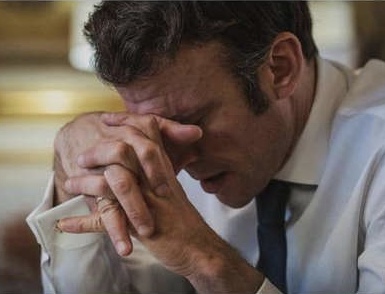Reports emerged on Sunday 5th September indicating that the French government is in talks with the new rulers of Niger, to discuss the rapid removal of French troops from Niger’s soil. The talks represent a major step down for the French premier, who has consistently refused to recognise the authority of what he refers to as the ‘Putschists’ in Niger as he has publicly said that he intends to defend France’s presence at all costs.
French President Macron, stubbornly defends France’s historic role in the Sahel region
Addressing a conference of French Ambassadors at the Elysée Palace, last week, he said:
‘The weakness that some have shown toward previous putsches has fed regional vocations. There is an epidemic of putsches throughout the Sahel…Our policy is simple. We do not recognize the putschists, we support a president who has not resigned, and to whose side we remain committed. And we support a diplomatic solution, or a military one when it is decided, by ECOWAS [the Economic Community of West African States]’
He went on to defend his resolute position on Niger and to reject the allegations of plunder and robbery by the former colonial power on African states. He said:
‘If France hadn’t intervened, if our soldiers hadn’t fallen in Africa, if [the military operations against Islamic terrorism] Serval and then Barkhane hadn’t been decided, we wouldn’t be talking about Mali, Burkina Faso or Niger today’
Niger’s government invokes ‘persona non grata’ authority as it demands the removal of French Ambassador and French troops
The French premier completely rejected the Niger government’s demand on 31st August, for Sylvain Itté, the French Ambassador to Niger, to leave the country. The new authority in Niger declared the French Ambassador’s diplomatic immunity to be revoked, in accordance with Article 9 of the Vienna Convention on Diplomatic Immunities and Privileges, rendering him ‘persona non grata’.
There were threats that Niger police would be deployed to physically remove the Ambassador from his residence and expel him from the country. There were even reports that the electricity, water and communications supply to the embassy had been shut off at the request of the government. Some pundits suggested that President Macron’s refusal to adhere to the requests, was a precursor to France adopting a military offensive – a speculation that received stimulus when Algeria publicly announced that it had refused France’s request to use its airspace in the event of a conflict. Niger’s military leader, Abdourhamane Tiani proclaimed on 17th August that regional sanctions against Niger were backed by France as he said, a deliberate ‘plan to dismantle our country’. Niger’s Prime Minister, Ali Lamine Zeine openly disputed the likelihood of the intervention threat saying:
‘Out of the 15 ECOWAS members, maybe three or four are behind a military intervention…all the dispositions are in place and we’re ready to defend ourselves if it comes to it’
Tens of thousands of protesters gather in Niger’s main capital and lay siege to the French army barracks
Yet, on Tuesday 5th of September, as tens of thousands of supporters of the overthrow in Niger, entered their 4th day of siege outside the barracks of the French Army on the edge of the capital Niamey, demanding that the 1500 troops stationed there leave the state, it seems that the bold stance of President Macron is likely to end in capitulation to their demands.
One month deadline for French troop removal expires
Niger’s new leadership officially ended the long standing military cooperation with its former colonial ruler on August 3rd, at which time it set a deadline for the removal of troops within a month. As talks were under way, Niger’s new Prime Minister, Ali Lamine Zeine, made the following statement on Monday to news reporters:
‘The government has already revoked the deals that allow for the French troops to operate in our territory…they’re here illegally. Talks are underway, which should allow for a swift withdrawal’
New Niger government hikes the price of its Uranium
The weekend also saw the Niger government announce an increase in the price of Uranium from €0.80 per kilogram which France has been historically paying to €200 per kilogram, the price charged to France by Canada for its Uranium. Although Niger is responsible for only 20% of France’s Uranium requirements, the increase represents both a financial and moral rebuttal to France’s historical role on Niger and its former colonies.


















